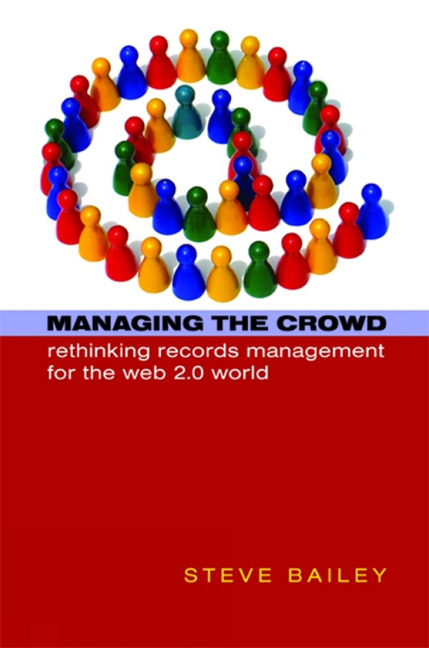Book contents
- Frontmatter
- Dedication
- Contents
- Foreword
- Preface
- Part 1 The Nature Of The Changing World
- Part 2 Is records management no longer fit for purpose?
- Part 3 Records Management.0 And The Future Of Records Management 121
- 11 The 10 defining principles of Records Management 2.0
- 12 Expanding on the principles
- Index
12 - Expanding on the principles
from Part 3 - Records Management.0 And The Future Of Records Management 121
Published online by Cambridge University Press: 08 June 2018
- Frontmatter
- Dedication
- Contents
- Foreword
- Preface
- Part 1 The Nature Of The Changing World
- Part 2 Is records management no longer fit for purpose?
- Part 3 Records Management.0 And The Future Of Records Management 121
- 11 The 10 defining principles of Records Management 2.0
- 12 Expanding on the principles
- Index
Summary
Questions addressed in this chapter
• Do the concepts currently transforming resource discovery offer us the possibility of a new basis to our records management theory?
• Is it really conceivable that we could trust the collected wisdom of our users to play an active role in the appraisal process?
• Are we witnessing a psychological shift away from a generation of users who wish to keep everything private towards one who wants to share everything?
• Are there any constants in the Web 2.0 environment that may provide us with a common platform for developing management solutions?
• How can we make sure that records management remains fit for purpose in the future?
• How can we ensure that Records Management 2.0 is embraced both by records managers and the users on whom they rely?
For the remainder of this book I shall attempt to put some ‘meat on the bones’ as far as the 10 principles of Records Management 2.0 are concerned. However, it should be noted that what follows is not intended as a definitive description of what each principle means; instead they collectively represent just a few of my own thoughts as to the implications of each principle and what they may mean for the nature of records management, combined with some suggested theoretical ways forward. It is quite conceivable that there are many other possible interpretations of each principle; what follows is
designed to provoke further thought and debate, not to be definitive.
Principle 1: Scalable to an (almost) infinite degree
The limiting factor when it comes to the scalability of records management is, largely, due to its reliance on the participation of records managers themselves. More specifically, it is the way in which records management has created systems and processes that place records managers at their heart and rely on them to establish the policies, update the standards or initiate the procedures. As we have seen, this is true whether we are talking about developing a file plan, maintaining a metadata schema or appraising records.
The IT community has discovered that there is another way, and that is to place a greater degree of trust in the users themselves. The concept of tagging information for resource discovery, based on user-defined folksonomies, is not only infinitely scalable, it actually gets more effective as more users participate.
- Type
- Chapter
- Information
- Managing the CrowdRethinking records management for the Web 2.0 world, pp. 129 - 164Publisher: FacetPrint publication year: 2008



